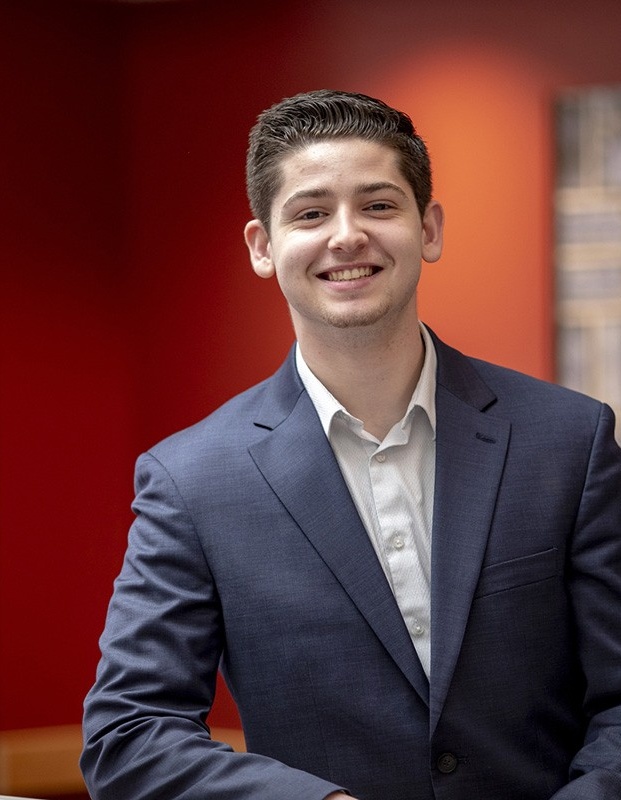Saving summer
Despite pandemic, corporate partners and CRC help students thrive
By Jacqueline Molik Ghosen
First-year MBA Aritra Chakraborty was ahead of the game.
Chakraborty
By fall 2019, he had already secured his summer 2020 internship with a major private corporation. Then, in spring, he learned it was canceled due to the COVID-19 crisis.
“I was heartbroken,” he says.
School of Management students know that career preparation and job search don’t just happen in the last six weeks of their final semester. Thanks to the Career Resource Center (CRC), their professional development journey begins before they even set foot in a classroom. Throughout their time in the school, they work with the CRC to build their career arsenals—résumés, cover letters, interviewing skills, internships, networking and more.
But what happens when students’ carefully laid plans are disrupted by a worldwide pandemic? In the UB School of Management, the answer is clear—they adapt.
Chakraborty, for instance, could have scrapped the idea of a summer internship entirely. Rather than losing hope, however, he remained optimistic and worked with the CRC to take action. He applied to the school’s Entrepreneurship Clinic (E-Clinic) led by Bob Neubert, clinical assistant professor and director of entrepreneurship academic programs, where students work in cross-functional teams to assist small businesses and nonprofits.
By early June, Chakraborty was working on projects for three separate businesses—RCR Yachts, Rally and Strayos—contributing in such areas as market segment research, brand building and developing scheduling algorithms and scoring systems. In addition to gaining a breadth of real-world experience, he was making a positive impact on organizations hard-hit by the crisis.
Tools for success
Agility was critical for employers, as well, according to Gwen Appelbaum, assistant dean and director of the CRC. Geico, for example, sponsors the CRC’s Interview Challenge each semester, and when students were sent home in March to finish the school year online, the company could easily have canceled the event.
“Instead, they did what they were doing for their regular recruiting,” she says. “They honored their commitment and opted to conduct all the interviews virtually, even hosting an award ceremony via Zoom at the end.”
Nardozza
Noah Nardozza, a sophomore who won $1,500 in the Interview Challenge, lauded both the CRC and Geico for their support and encouragement throughout the process.
“Despite the pandemic, they did an outstanding job and it was a beautifully executed event,” he says.
Goldman Sachs also moved quickly to preserve the strong reputation it had earned on campus, making internships shorter and virtual and delaying their start date.
“When the outbreak hit, they adjusted accordingly and communicated openly with students,” Appelbaum says. “They even committed to paying students for the entire length of their original internship.”
Appelbaum says several organizations and industries were at an advantage because of the foundation they had in place. “Banks, in particular, were well-positioned to launch digital internships because they have been using virtual processes in their recruitment for some time now,” she says. “This was a natural next step.”
Citi, a top employer of School of Management graduates, held a virtual town hall with students in May to assure them that they are still actively recruiting. Representatives at Citi, including School of Management alumni, shared stories of the bank’s success in the COVID-19 remote work environment and the creative solutions they’ve implemented, encouraging students to look for opportunity in the disruption.

“We were able to convert 90% of our internships to virtual."
Carrie Gardner
Director of Internships and Experiential Learning
School of Management
Internship about face
“We were able to convert 90% of our internships to virtual,” says Carrie Gardner, director of internships and experiential learning for the School of Management. “Initially there was so much uncertainty, but it really came down to reaching out early, listening to what our internship employers needed and offering solutions that filled those needs while keeping the safety of our students as our paramount concern.”
Gardner says employers were open to new ideas and happy to find ways to move forward, thanks to the strong collaborative relationships already in place. “We put together some really useful tools and sent out a list of best practices for virtual internships,” Gardner says. “And we incorporated more flexibility into our side of the process as well.”
One example of that flexibility was the implementation of micro-internships: While typical internships extend over an entire semester or summer session, micro-internships are shorter in duration, can be conducted remotely and focus on a single project, often in response to emerging needs within an organization.
“In some cases, a full-blown 10-week internship would have been too much for an employer to take on, so having the option to offer a micro-internship was an ideal compromise,” Gardner says. “It was helpful to be able to offer both options.”
Culture is key
The internship team also asked companies for ideas on best practices, and one company summed it up well.
“You need to be nimble to survive in a time like this,” says Alexander Lisowski, head of team and client relations for CoachMePlus, an online strength and conditioning platform, and recruiter of School of Management interns. “Before anything goes wrong, you need to establish a culture and look for individuals who share the same enthusiasm, commitment and love of what they do. Those people will find a way to make things work, regardless of the situation.”
An evolving model
Although the coronavirus caused unprecedented challenges, there is a silver lining: Even after the crisis is resolved, many of the changes the school and its corporate partners have made are here to stay. Virtual internships can open up experiential learning opportunities around the world. Companies that can’t make it to Buffalo for in-person interviews are now confident with Zoom and other technologies. And students have demonstrated that by tapping in to School of Management resources and adding a healthy dose of grit and determination, they can thrive in even the most adverse situations.
If your organization has an internship or job lead for our students or graduates, contact Amy Johnson, employer relations manager, at aj53@buffalo.edu, or Carrie Gardner, director of internships and experiential learning, at cg53@buffalo.edu.

